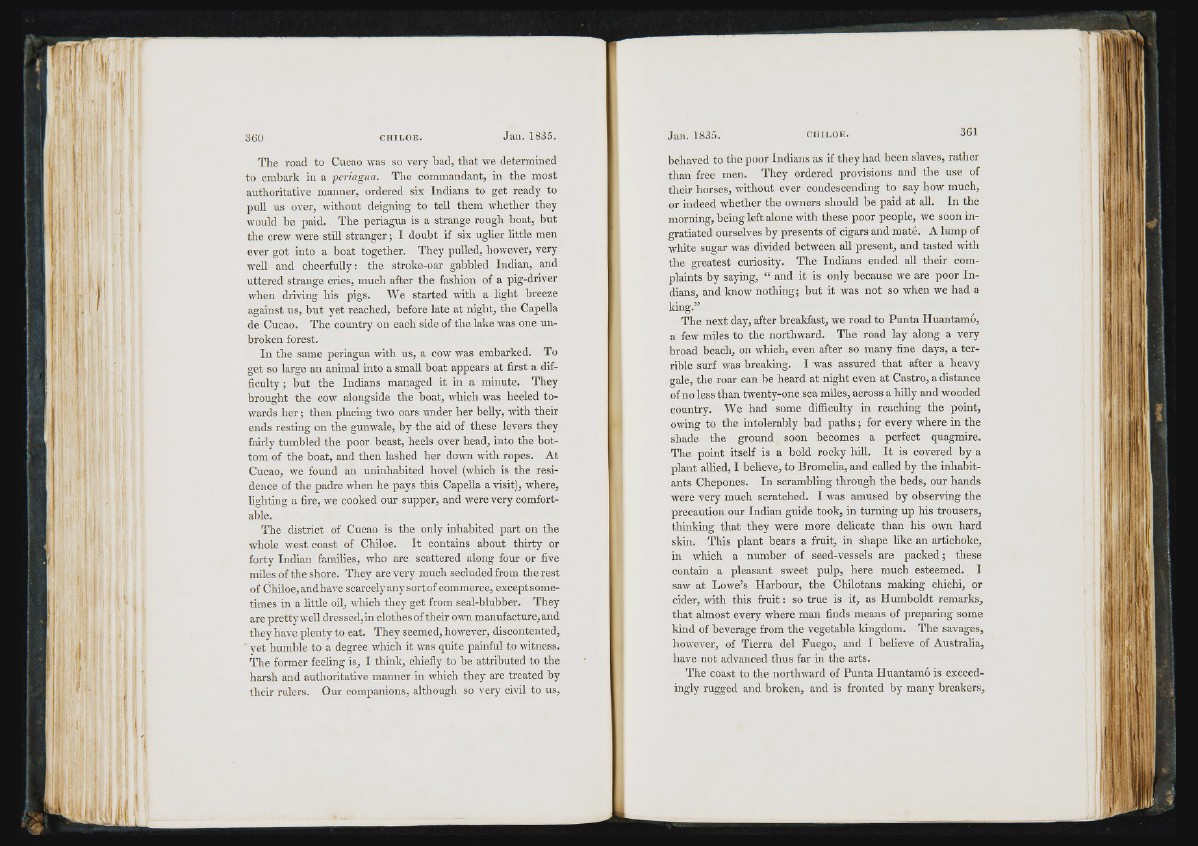
The road to Cucao was so very bad, that we determined
to embark in a periagiia. The commandant, in the most
authoritative manner, ordered six Indians to get ready to
puU us over, without deigning to tell them whether they
would he paid. The periagua is a strange rough boat, but
the crew were still stranger; I doubt if six uglier little men
ever got into a boat together. They pulled, however, very
well and cheerfully: the stroke-oar gabbled Indian, and
uttered strange cries, much after the fashion of a pig-driver
when drh-ing his pigs. We started with a light breeze
against us, but yet reached, before late at night, the Capella
de Cucao. The country on each side of the lake was one unbroken
forest.
In the same periagua with us, a cow was embarked. To
get so large an animal into a small boat appears at first a difficulty
; but the Indians managed it in a minute. They
brought the cow alongside the boat, which was heeled towards
her; then placing two oars under her belly, with their
ends resting on the gunwale, by the aid of these levers they
fairly tumbled the poor beast, heels over head, into the bottom
of the boat, and then lashed her down with ropes. At
Cucao, we found an uninhabited hovel (which is the residence
of the padre when he pays this Capella a visit), where,
lighting a fire, we cooked our supper, and were very comfortable.
The district of Cucao is the only inhabited part on the
whole west coast of Chiloe. It contains about thirty or
forty Indian families, who are scattered along four or five
miles of the shore. They are very much secluded from the rest
of Chiloe, andhave scarcely any sort of commerce, exceptsome-
times in a little oil, which they get from seal-blubber. They
are prettywell dressed,in clothes of their own manufacture, and
they have plenty to eat. They seemed, however, discontented,
' yet humble to a degree which it was quite painful to witness.
The former feeling is, I think, chiefly to be attributed to the
harsh and authoritative manner in which they are treated by
their rulers. Our companions, although so very civil to us,
behaved to the poor Indians as if they had been slaves, rather
than free men. They ordered provisions and the use of
their horses, without ever condescending to say how much,
or indeed whether the owners should be paid at all. In the
morning, being left alone with these poor people, v/e soon ingratiated
ourselves by presents of cigars and maté. A lump of
white sugar was divided between all present, and tasted with
the greatest curiosity. The Indians ended all their complaints
by saying, “ and it is only because we are poor Indians,
and know nothing; but it was not so when we had a
king.”
The next day, after breakfast, we road to Punta Huantamó,
a few miles to the northward. The road lay along a very
broad beach, on which, even after so many fine days, a terrible
surf was breaking. I was assured that after a heavy
gale, the roar can be heard at night even at Castro, a distance
of no less than twenty-one sea miles, across a hilly and wooded
country. We had some difficulty in reaching the point,
owing to the intolerably bad paths; for every where in the
shade the ground soon becomes a perfect quagmire.
The point itself is a bold rocky hill. It is covered by a
plant allied, I believe, to Bromelia, and caUed by the inhabitants
Chepones. In scrambling through the beds, our hands
were very much scratched. I was amused by observing the
precaution our Indian guide took, in turning up his trousers,
thinking that they were more delicate than his own hard
skin. This plant bears a fruit, in shape hke an artichoke,
in which a number of seed-vessels are packed; these
contain a pleasant sweet pulp, here much esteemed. I
saw at Lowe’s Harbour, the Chilotans making chichi, or
cider, with this fruit; so true is it, as Humboldt remarks,
that almost every where man finds means of preparing some
kind of beverage from the vegetable Idngdom. The savages,
however, of Tierra del Fuego, and I believe of Australia,
have not advanced thus far in the arts.
The coast to the northward of Punta Huantamó is exceedingly
rugged and broken, and is fronted by many breakers,